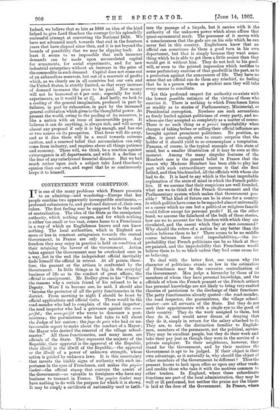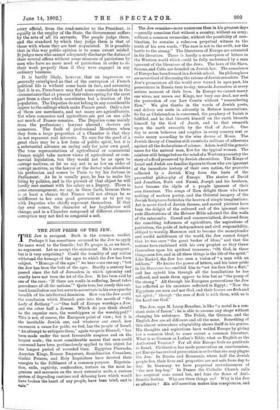CONTENTMENT WITH CORRUPTION.
IT is one of the many problems which France presents to an admiring—and wondering—Europe that her people combine two apparently incompatible sentiments,— profound submission to, and profound distrust of, their own rulers. The first feeling may be supposed to be the result of centralisation. The idea of the State as the omnipotent authority, which nothing escapes, and for which nothing is either too small or too vast, comes home to a Frenchman in a way of which an Englishman blows and can know nothing. The local authorities, which in England are more or less in constant antagonism towards the central Government, in France are only its ministers. Any freedom they may enjoy in practice is held on condition of their retaining the favour of the Government. Action taken against the Government may be overlooked once in a way, but in the end the independent official inevitably finds himself the official in retreat. At all points, there- fore, the peasant or the artisan is confronted by the Government. In little things as in big, in the everyday business of life as in the conduct of great affairs, tho official is omnipresent. Mr. Bodley gives in his " France " the reasons why a certain friend of his refused to be a Deputy. Were I to become one, he said, I should also "become the protector of all the petty functionaries in the district. From morning to night I should be beset by official applications and official visits. There would be the road-mender who had to complain of the road inspector; the road inspector who had a grievance against the sous- prefet ; the sous-pr(yet who wrote to denounce a post- mistress ; the postmistress who had tales to tell about the Judge of her canton ; the juge de paix who had an un- favourable report to make about the conduct of a Mayor ; the Mayor who desired the removal of the village school- master." All these functionaries, and many more, are officials of the State. They represent the majesty of the Republic, their approval is the approval of the Republic, their illwill is the illvrill of the Republic,—the approval or the illwill of a power of unknown strength, whose action is guided by unknown laws. It is this uncertainty that invests the visible signs of authority with such im- portance in the eyes of Frenchmen, and makes the papier timbre—the official stamp that conveys the assent of the Government—so valuable to foreigners who have any business to transact in France. The papier timbre may have nothing to do with the purpose for which it is shown. It may be simply a certificate of nationality used to faeili- tate the passage of a bicycle, but it carries with it the authority of the unknown power which alone affixes that quasi-sacramental mark. The possessor of it moves with a consciousness that the gods are on his side which he can never feel in this country. Englishmen know that an official can sometimes do them a good turn in his own department, but that is simply because they want some- thing which he is able to get them a little sooner than they would get it without him. They do not look to his good- will, or even to the printed impression which testifies to some perfunctory exercise of that goodwill in the past, as to a protection against the annoyances of life. They have no sense that an official can do them any mischief, no feeling that he is a person whom as prudent men they will take every means to conciliate.
Yet this profound respect for authority co-exists with the lowest possible estimate of the virtues of those who exercise it. There is nothing to which Frenchmen listen so readily as to stories of Parliamentary, Ministerial, or Presidential corruption. Nowhere are such accusations so freely hurled against politicians of every party, and no- where are they accepted so completely as a matter of course. There is no such thing as a priori improbability when charges of taking bribes or selling their official influence are brought against prominent politicians. No position, no office, is great enough even to create surprise that the holder of it should yield to so commonplace a temptation. Panama, of course, is the typical example of this state of mind, but a smaller illustration of it may be seen at this moment. Among the many singular features of the Humbert case is the general belief in France that the reason why Madame Humbert has been able to play her part with such extraordinary success is that she first bribed, and then blackmailed, all the officials with whom she had to do. It is hard to say which is the least improbable explanation of the state of mind in which the French public live. If we assume that their suspicions are well founded, what are we to think of the French Government and the Parliamentary system which makes that Government pos- sible ? What kind of future can be in store for a country in which politics have come to be regarded almost universally as a career which no one but a political or religious fanatic would follow except for personal profit ? If, on the other hand, we assume the falsehood of the bulk of these stories, how are we to account for the freedom with which they are circulated, and the assent which they at once command Why should the rulers of a nation be any better than the nation believes them to be ? There seems to be no middle course between these rival improbabilities,—the • probability that French politicians can be as black at they are painted, and the improbability that Frenchmen would believe them to be so black unless they had some cause for so believing.
To deal with the latter first, one reason why the character of politicians stands so low in the estimation of Frenchmen may be the excessive centralisation of the Government. Men judge a hierarchy by those of its members of whom they have personal knowledge, and the officials of whom the French peasant or the French artisan has personal knowledge are not likely to bring very exalted theories of patriotism to the discharge of their functions. The petty functionaries already quoted—the road-mender, the road inspector, the postmistress, the village school- master—are all servants of the State. But they do not seek their appointments with a single eye to the good of their country. They do the work assigned to them, but they do it, and. would never dream of denying that they do it, simply in return for the salary attached to it. They are, to use the distinction familiar to English- men, members of the permanent, not the political, service. They may be excellent people, but they do their work and take their pay just as though they were in the service of a private employer. To their neighbours, however, they stand for the Government, and by their motives the Government is apt to be judged. If their object is their own advantage, as it naturally is, why should the object of other members of the Government be different ? Thus the peasant learns to look upon office as upon any other trade, and credits those who take it with the motives common to other traders. In England, where these subordinate functions are part of the local administration, they may be well or ill performed, but neither the praise nor the blame is laid at the door of the Government. In France, where
every official, from the road-mender to the President, is equally in the employ of the State, the Government suffers by the acts of all its servants. The people judge them, and the standard by which they judge them is that of those with whom they are best acquainted. It is possible that in this way public opinion is to some extent misled. It judges men who cannot adequately discharge the duties of their several offices without some measure of patriotism by men who have no more need of patriotism in order to do their work properly than if they were engaged in any ordinary business.
It is hardly likely, however, that an impression so generally entertRined as that of the corruption of French political life is without some basis in fact, and assuming that it is so, Frenchmen may find some consolation in the circumstance that at present their rulers spring for the most part from a class which constitutes but a fraction of the population. The Deputies do not belong in any considerable degree to the callings which make France great. Only a few of them are merchants, and not many are agriculturists. Yet when commerce and agriculture are put on one side not much of France remains. The Deputies come mainly from the professions ; lawyers abound ; doctors are numerous. The fault of professional Members when they form a large proportion of a Chamber is that they do not represent real interests. To care for the good of a great class may be a low form of public spirit, but it is a substantial advance on caring only for your own good. The true representatives of agricultural or commercial France might take narrow views of agricultural or com- mercial legislation, but they would not be as open to corrupt motives, or let us say not to as low an order of corrupt motives, as the lawyer or the doctor who abandons his profession and comes to Paris to try his fortune in Parliament. As he is usually poor, he has to make his living by politics, and. in the pursuit of that object he will hardly rest content with his salary as a Deputy. There is some encouragement, we say, in these facts, because there is at least a chance that France will not always be so indifferent to her own good government as to put up with Deputies who chiefly represent themselves. If that day ever comes, the character of her Legislature will change, and in a Chamber composed of different elements corruption may not find so congenial a soil.











































 Previous page
Previous page